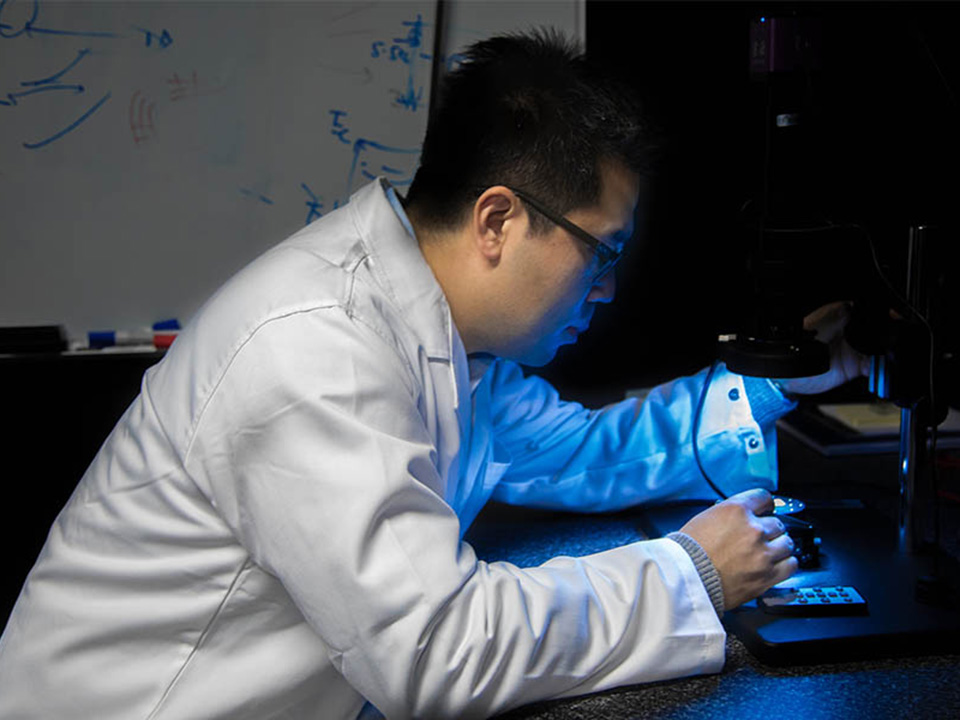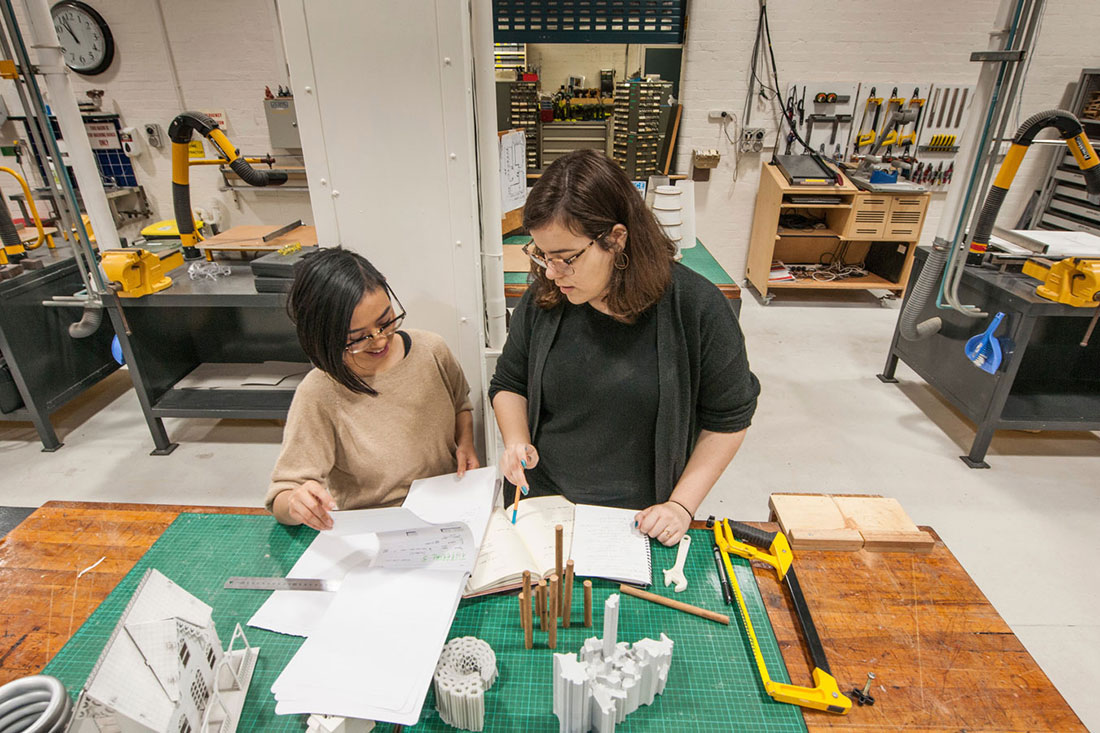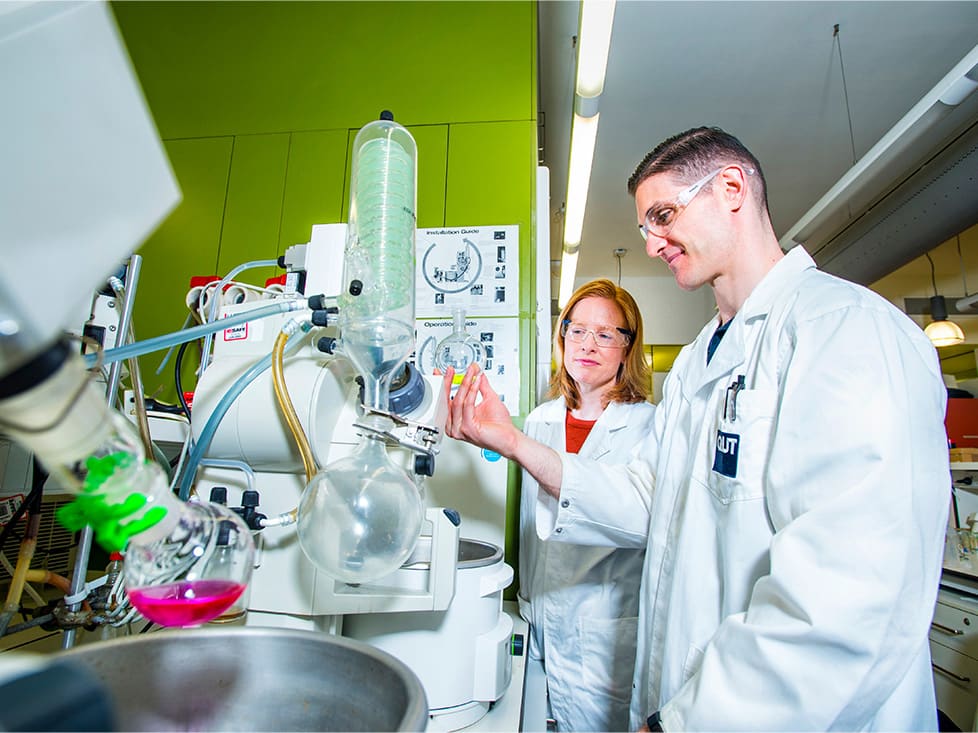
Our teaching and research advances the frontiers of the chemical and physical sciences to solve real-world challenges.
We specialise in research covering diverse topics, including:
- studies of particles, fields and radiation and their interaction with matter
- the design, synthesis, characterisation and study of the properties of molecules and materials
- the implementation of these molecules and materials in various applications.
Our outcomes have included finding cheaper and efficient materials for storing renewable energy, and determining the elasticity of crystals down to the atomic level.
Our research
Surface Science and 2D Materials
The Surface Science and 2D Materials Group investigates matter on the nano-scale to design and engineer 2D materials that have applications in electronics, energy, environmental and sensing technologies.
Molecular Recognition and Sensors
The Molecular Recognition & Sensors team is a multi-disciplinary research group interested in the development and application of nanotechnology for identification and quantification of selected analytes.
MACROARC Soft Matter Materials Group
Established in 2008, and now calling Brisbane home, the MACROARC lab houses over 40 active researchers in the field of synthetic and physical polymer material science.
Inorganic Nanomaterials Lab
The Golberg Group at QUT designs inorganic nanomaterials for structural and green energy applications.
National Battery Testing Centre
The National Battery Testing Centre (NBTC) was established at the Queensland University of Technology to test multiple types and sizes of battery systems in real-world conditions for Australian applications.
Medicinal Molecules and Materials Group
The Medicinal Molecules and Materials Group is a collaborative team of organic, medicinal and polymer chemists, looking to understand how precision chemistry can be used to solve clinical health problems.

Our research partnerships
We're working with you to find solutions to your problems. Reach result through a collaborative partnership with our experienced research experts who make active contributions to their fields.
Learning and teaching experience
Our chemistry and physics courses have a strong applied emphasis so our students spend a significant amount of time in laboratories developing extensive practical skills.

Our facilities
Our staff

- Position
- Acting Head of School, Chemistry and Physics
- School
- School of Chemistry & Physics
- Research fields
- Macromolecular and materials chemistry
- Organic chemistry
- Physical chemistry
- j.blinco@qut.edu.au

- Position
- Senior Deputy Vice-Chancellor and Vice-President (Research)
- Division / Faculty
- Office of the SDVC
- Research fields
- Macromolecular and materials chemistry
- Nanotechnology
- Organic chemistry
- christopher.barnerkowollik@qut.edu.au

- Position
- Pro Vice-Chancellor (Research Infrastructure)
- Division / Faculty
- Research Portfolio
- Research fields
- Analytical chemistry
- Physical chemistry
- Other chemical sciences
- stephen.blanksby@qut.edu.au

- Position
- Deputy Dean
- Division / Faculty
- Office of the Deputy Dean
- Research fields
- Condensed matter physics
- Nanotechnology
- jennifer.macleod@qut.edu.au

- Position
- Professor
- Division / Faculty
- School of Chemistry & Physics
- Research fields
- Physical chemistry
- Analytical chemistry
- Environmental management
- g.ayoko@qut.edu.au

- Position
- Professor
- Division / Faculty
- School of Chemistry & Physics
- Research fields
- Organic chemistry
- Macromolecular and materials chemistry
- Medicinal and biomolecular chemistry
- s.bottle@qut.edu.au

- Position
- Professor
- Division / Faculty
- School of Chemistry & Physics
- Research field
- Macromolecular and materials chemistry
- t.dargaville@qut.edu.au
News and events

QUT awarded $9.87 million in ARC Discovery grants
QUT is celebrating the award of $9.87 million ARC Discovery grants to fund 16 projects.

All aboard: CSIRO science ship exhibit docks at QUT for holidays
A 12-metre shipping container that gives science lovers a taste of life aboard Australia’s ocean research vessel (RV) Investigator is on display at QUT in inner Brisbane over the school holidays.

$2.8M project to reduce cotton industry’s greenhouse gas emissions
A project to reduce greenhouse gas emissions from cotton production systems to enable Australia to be the preferred international supplier of low emissions fibre has received $1,985,000 from the Australian Government’s Climate-Smart Agriculture Program Partnerships and Innovation Grants Round and $800,000 from the Cotton Research and Development Corporation (CRDC).
Contact us
Contact the School of Chemistry and Physics for more information on our courses, research and staff.